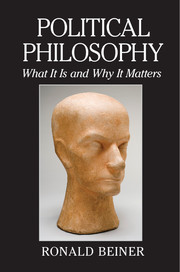Book contents
- Frontmatter
- Dedication
- Contents
- First Prologue: Horizons of Political Reflection
- Second Prologue: Freud, Weber, and Political Philosophy
- 1 Hannah Arendt: The Performativity of Politics
- 2 Michael Oakeshott: Life’s Adventure
- 3 Leo Strauss: The Politics of Philosophy
- 4 Karl Löwith: In Awe of the Cosmos
- 5 Excursus on Nature and History in the Strauss-Löwith Correspondence
- 6 Eric Voegelin: Modernity’s Vortex
- 7 Simone Weil: The Politics of the Soul
- 8 Hans-Georg Gadamer: Philosophy without Hubris
- 9 Jürgen Habermas: Politics as Rational Discourse
- 10 Michel Foucault’s Carceral Society
- 11 Alasdair MacIntyre: Fragmentation and Wholeness
- 12 Short Excursus on the Rise and Decline of Communitarianism as a Political Philosophy
- 13 John Rawls and the Death of Political Philosophy
- 14 Richard Rorty: Knocking Philosophy off Its Pedestal, or the Death of Political Philosophy Postmodernized
- Epilogue: On Not Throwing in the Towel
- Index
- References
6 - Eric Voegelin: Modernity’s Vortex
Published online by Cambridge University Press: 05 August 2014
- Frontmatter
- Dedication
- Contents
- First Prologue: Horizons of Political Reflection
- Second Prologue: Freud, Weber, and Political Philosophy
- 1 Hannah Arendt: The Performativity of Politics
- 2 Michael Oakeshott: Life’s Adventure
- 3 Leo Strauss: The Politics of Philosophy
- 4 Karl Löwith: In Awe of the Cosmos
- 5 Excursus on Nature and History in the Strauss-Löwith Correspondence
- 6 Eric Voegelin: Modernity’s Vortex
- 7 Simone Weil: The Politics of the Soul
- 8 Hans-Georg Gadamer: Philosophy without Hubris
- 9 Jürgen Habermas: Politics as Rational Discourse
- 10 Michel Foucault’s Carceral Society
- 11 Alasdair MacIntyre: Fragmentation and Wholeness
- 12 Short Excursus on the Rise and Decline of Communitarianism as a Political Philosophy
- 13 John Rawls and the Death of Political Philosophy
- 14 Richard Rorty: Knocking Philosophy off Its Pedestal, or the Death of Political Philosophy Postmodernized
- Epilogue: On Not Throwing in the Towel
- Index
- References
Summary
Eric Voegelin is another theorist of the crisis of modernity. His crisis is a crisis in how modern societies stand in relation to the reality of transcendence. Like Karl Löwith, who was discussed in Chapter 4, Voegelin subscribes to an ambitious version of the secularization thesis – that is, the thesis that modern philosophies take the extravagant form that they do because they think that they, and they alone, can fulfill the expectations of human salvation that were aroused by eschatological religions, and which those religions proved themselves (in the modern view) incapable of satisfying. Modernity as modernity rejects the reality of transcendence and, hence, replaces it with its own substitute realities or surrogate realities. These latter generate a whole range of violent pathologies, and these pathologies, viewed in the aggregate, constitute the crisis of modernity. That is the broad meta-narrative; the rest of Voegelin’s political philosophy is devoted to working out the details.
The term “modernity” figures in the titles of two of the six chapters in The New Science of Politics (namely chapters 4 and 6). The book as a whole is clearly directed toward coming to an understanding of fully-unfolded modernity at its worst (as Voegelin apprehends it), and this purpose is served by, among other things, tracing the specific pathology back to political, religious, and intellectual tendencies in early modernity. (Chapter 5, for instance, offers an interesting interpretation of the rise of Puritanism and its political consequences.) However, Voegelin in no sense loses sight of premodern (and especially ancient) ways of thinking and ways of conceiving political order, for the premodern and the non-modern is at all times Voegelin’s authoritative standard for judging what he considers the far less philosophical thinking proper to modernity. Indeed, Voegelin gives us a leading example of a mid-twentieth-century critic of modernity whose critique of modernity is inspired not by Heidegger but by Plato. Perhaps one could say the same about Leo Strauss, but Voegelin takes Platonic metaphysics seriously in a way that Strauss certainly does not. (For Voegelin, all metaphysics is simultaneously theology, and therefore it is impossible to say, either in the case of Plato or in that of Aristotle, where metaphysics stops and theology begins: for him they are indistinguishable.)
- Type
- Chapter
- Information
- Political PhilosophyWhat It Is and Why It Matters, pp. 91 - 107Publisher: Cambridge University PressPrint publication year: 2014

